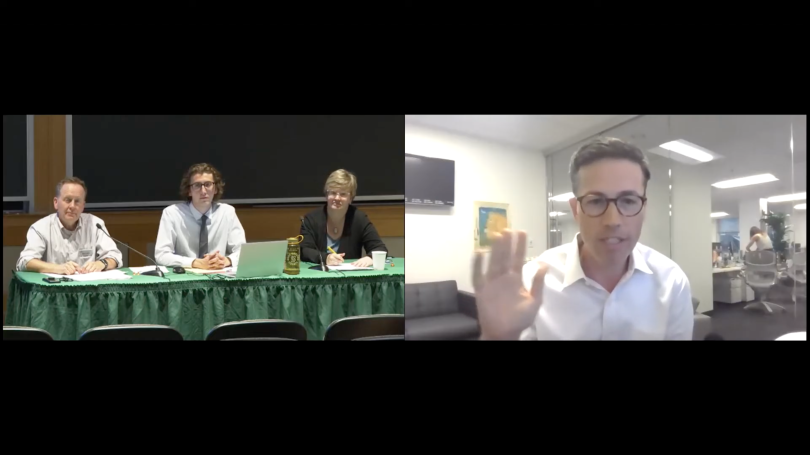
- Public Policy
- Leadership
- Funding
- News & Events
- About the Center
Back to Top Nav
Back to Top Nav
Back to Top Nav
Back to Top Nav
July 14, 2021, the Rockefeller Center hosted “How to Land an Internship,” an event in which students, staff, and alumni alike shared their experiences applying, searching, and recruiting for internships in the public and private sectors. Moderated by Assistant Director for Co-Curricular Programs Bob Coates, panelists Sasha Kokoshinskiy ’22, E. Chandlee Bryan, and Matt McDonald ’00 shared their takeaways from their experiences in the internship hiring process and provided advice to students seeking to gain internship experience for the first time.
Bryan, Assistant Director at Dartmouth’s Center for Professional Development (CPD), shared a bevy of resources available to Dartmouth students seeking internships as well as guidance throughout the hiring process. Noting the launch of the CPD’s new student portal, Handshake, Bryan explained that students can not only seek out advice and opportunities from mentors and professionals, but their peers as well. “You can literally network at all levels,” she added, suggesting that fellow students can provide insights on opportunities that may or may not have worked for them. Bryan also provided a list of resources for job-seekers that included places that students may not traditionally look in; one example was the Dartmouth Library, which offers resources for locating jobs in the public sector. Ultimately, Bryan emphasized, “the biggest piece of advice that I can give you is not to go through this process alone;” whether it be by accessing online resources, networking, or visiting Career Coaches at the CPD, Dartmouth has several tools that students can take advantage of as they seek out internships.
Meanwhile, McDonald, a Partner at Hamilton Place Strategies who started his career working on political campaigns before transitioning to public affairs consulting, provided insight on the hiring process from the point of view of a recruiter. When seeking out places of interest to work, McDonald explained, “identify as many places as you can that would be interesting and apply as much as you can.” Given the thousands of prospective interns all over the world who may be applying for the same position, casting a wide net for opportunities oof interest and “building out that big list of all the places that are possible” is key to optimizing your chances for an offer. In particular, McDonald emphasized the importance of not overlooking smaller organizations that “might not have the brand but that you might actually learn a lot [from] and be able to do some real hands-on work” with; often, he said, many of those experiences have great takeaways that can help highlight your skills when it comes time to apply to a full-time position.
For a first-time internship seeker, McDonald added that unique “indications of interest” are key to distinguishing yourself from the hundreds of peers who have applied for the same role. Any extra additions to your cover letter such as your interest in a unique facet of the company or personal outreach by email or networking are both great ways to indicate your excitement for a role in a manner that will assure employers that you are sure to work with them should they extend an offer.
Kokoshinskiy, a former ’22 who decided to pursue a gap year this past year, had the opportunity to apply many of the tips and resources McDonald and Bryan mentioned. After applying to over 100 opportunities, Kokoshinskiy was able to secure five different internships through five different outlets ranging from the Rockefeller Center and the Dickey Center for International Understanding to alumni networking and the formal recruiting process. Furthermore, he was able to experience several different work environments and styles, from work in the public sector and small think tanks to more corporate work at larger organizations. Through this past year and the plethora of different opportunities it provided, Kokoshinskiy learned that “it’s important to realize that you can learn anything from any internship… even if you don’t enjoy it, there’s things that you can still take out of it.” Every internship, he explained, furthered his understanding of his career of interest, either by making him excited about a specific sector or discouraging him from applying for jobs in that sector moving forward. In “packaging” yourself through your resume and aggregating interests that speak to employers, Kokoshinskiy also encouraged students to “tailor… yourself for who you really are; you really don’t want to…put up a façade of…what you’re interested in.” “Sometimes, it’s okay to show your niche,” he explained, citing the one interest on his resume that employers seem to mention at every interview: contra dance.
For more information about internships in public policy, you can visit the Rockefeller Center’s website, where you can take a look at internship opportunities and schedule advising meetings with students.
-- Written by Shawdi Mehrvarzan ’22, Rockefeller Center Student Assistant for Public Programs